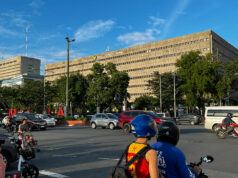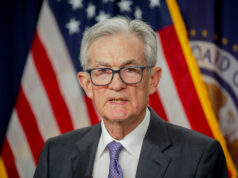Palace rejects Cha-cha moves amid pandemic
THE presidential palace on Monday rejected a congressional move to change the 1987 Constitution amid a coronavirus pandemic, saying it was no longer a priority.
President Rodrigo R. Duterte would rather focus on defeating the COVID-19 virus first, his spokesman Harry L. Roque told an online news conference.
The President respects the desire of about 1,500 municipal mayors who reportedly endorsed charter change, he added.
“The President and the entire National Government are focused on our COVID-19 problem through the Inter-Agency Task Force,” Mr. Roque said. “So charter change is not a priority.”
Senator Franklin M. Drilon on Sunday said moves to change the Constitution amid the pandemic won’t prosper in the Senate, as he warned of an alleged plot to delay the 2022 presidential elections and remove term limits.
About 1,500 municipal mayors were reportedly pushing to amend the charter to institutionalize the higher share of local governments in national taxes and ease restrictions on foreign investments.
Cagayan de Oro Representative Rufus B. Rodriguez on Monday said the House committee on constitutional amendments that he heads would meet to discuss two proposals seeking to amend the charter when sessions resume later this month.
“I will call a virtual meeting of our committee possibly within the first two weeks of our session to tackle the proposals of our 1,489 town mayors and other pending measures,” he said in a statement.
The congressmen said the meeting would try to get the sentiments of committee members after the fresh charter change push. The 18th Congress will open its second regular session on July 27.
The Department of Interior and Local Government last week said the League of Municipalities wanted to institutionalize the higher share of local governments in national taxes and ease restrictions on foreign investments.
“The internal revenue allotments for the local government units will be significantly increased which are needed to address the COVID-19 pandemic and other local development programs, and strengthen local autonomy,” Mr. Rodriguez said.
The shift to a federal form of government was among the campaign promises of President Rodrigo R. Duterte, beginning with the appointment of a 22-member Consultative Committee in January 2018.
The body, which reviewed the 1987 Constitution, drafted the Bayanihan Federalism bill for submission to the 17th Congress.
“As for the lifting or relaxation of restrictions on foreign investment and even ownership of businesses, there are already resolutions filed in the committee by some representatives,” he said.
Mr. Drilon earlier said there was no need to legislate local governments’ share in national taxes because it has been institutionalized.
A new proposal is pending at the House that seeks to lift limits on foreign investments and the grant of a franchise to public utilities, among other economic provisions. It will also increase the number of senators to 27.
Senators’ term of office will be cut to five years from six, while congressmen can serve for five years from three years.
Mr. Drilon said the Senate was working on opening up the economy to more foreign investments through changes to the Public Service Act and Retail Trade Liberalization Act, which are both pending at the committee level.
The intention was to postpone the 2022 elections and, failing that, remove term limits, he said.
Moves to amend the charter were put in the backburner after they failed to gain support at the Senate before the 17th Congress adjourned.
Mr. Duterte had also created a task force headed by the Interior secretary to propose changes to the Constitution. The body had sought to remove economic restrictions in the charter, including the ban on foreign investment in some industries.
The Philippines is at the bottom of Southeast Asian countries in terms of foreign direct investment, and Mr. Duterte wanted to change this by changing the constitution the task force had said.
The Finance department wanted to eliminate all references to citizenship restrictions with respect to industries such as mass media and advertising, educational institutions, practice of professions, natural resources, mineral wealth and public utilities.
The task force had wanted to retain the prohibition on foreigners to own land.
The agency at the start of the year said at least 256 local chief executives had expressed their support for Mr. Duterte’s push to change the 1987 Charter. The task force also obtained 22,469 signatures from various citizens who support charter change.
The task force later submitted its second set of proposed changes to the charter to the House constitutional amendments committee. It wanted to strengthen political parties, ban turncoats and political dynasties as part of charter change.
The task force said the anti-political dynasty provision of the 1987 Constitution should be made self-executing. It also wanted to create a democracy fund for campaign finance reforms, and extend the terms of local government officials to five years with one re-election.
The second set of proposed changes covered political and electoral reforms to strengthen democracy and improve governance. It also sought to introduce equality provisions to ensure more funds flow to the provinces.
The task force was composed of 15 government agencies.
But Mr. Rodriguez deferred a committee report on proposed changes to the 1987 Constitution as his committee considered other proposals on federalism. — Charmaine A. Tadalan



